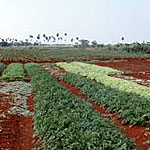By Michael Khoo
Minnesota Public Radio
September 25, 2002
Gov. Jesse Ventura is spending the next three days participating in the U.S. Food & Agribusiness Exhibition in Havana. The governor and leaders from several prominent Minnesota companies say the island nation presents a new market for the state's farmers, but Ventura's visit has drawn criticisms from Bush administration officials who say he's only lending legitimacy to Fidel Castro's government.
| |
|
|
|
||
For more than 40 years, U.S. trade with Cuba has been severely restricted, a policy meant to isolate and marginalize the government of communist leader Fidel Castro. Not until two years ago did the U.S. Congress act to ease commercial limitations. American companies can now export agricultural products to Cuba on a cash-basis.
Late in 2001, the first shipments -- including Minnesota corn -- began arriving. Ventura says with the opening of agricultural trade, the island nation represents an important market for the state's farmers.
"A lot of our state economy is highly based upon agriculture here. And any time you get an opportunity, it's no different than if you -- a new store would open up, you know? You want to go get your products in that store," Ventura said.
What started as a trickle is turning into a flood. John Kavulich of the U.S. Cuba Economic and Trade Council says so far this year, Cuba has already purchased more than $120 million in U.S. farm products, and he says it's anticipated that number will grow to $165 million by year end.
Kavulich says that's propelled Cuba to the United States' 51st-largest agricultural trading partner. Two year's ago, Cuba ranked dead last out of 228 countries.
"So it depends on how you look at it, but no farmer in the United States, no food broker in the United States is going to turn their back on a market that is now $125 million in 10 months on a cash basis," according to Kavulich.
Representatives of several big-name Minnesota companies are also attending the exhibition, including Land O' Lakes, Hormel, and Cargill.
Van Yeutter, Cargill's director of international business development, says the Cuban market represents only a fraction of Cargill's annual business. But he says the country's a natural fit for U.S. products, particularly given the recent economic stress in American agriculture.
"In a country where agricultural prices are quite low today, opening up new markets and providing ways for demand to be increased around the world is critically important for U.S. agriculture. So this is why a market like Cuba is very important and other markets around the world as well," Yeutter says.
But not everyone is so eager to see a larger American presence in Havana. In August, Florida Gov. Jeb Bush wrote to Ventura, encouraging him to cancel the Cuba mission.
And earlier this month Assistant Secretary of State Otto Reich delivered the same request from the Bush administration. Referring to the Cuban government as a "hostile regime," Reich suggested Ventura and Minnesota business leaders would only serve as props for President Castro.
Joe Garcia, the executive director of the Cuban-American National Foundation, calls Ventura's participation in the trade mission "unfortunate."
"He's going to Cuba to, in essence, lend legitimacy to a bankrupt dictatorship and a failed system of government that only presents negatives for the people that it governs and for the United States' foreign policy interests," according to Garcia.
Ventura, however, is unfazed. Although there remains a good chance he'll meet with Castro, Ventura says he'll stick to economic issues and leave the prickly business of foreign policy and human rights to others. And as with his China trade mission, Ventura says stronger trade relations invariably lead to greater freedoms for all parties. He says the U.S. embargo has been a dismal failure.
"All you're hurting -- you're not hurting Castro. I mean, does Gov. Bush and Secretary Reich really believe Castro's missing a meal because of this embargo? All you're hurting are the Cuban people. They have this obsession over one person: Castro. What about the other 9 million?" Ventura says.
Ventura will cut the ribbon opening the exhibition Thursday morning and return to Minnesota on Saturday.

